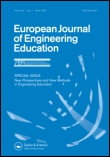
European Journal of Engineering Education
Scope & Guideline
Shaping the Future of Engineering Education Through Research
Introduction
Aims and Scopes
- Engineering Education Research:
The journal publishes studies that investigate pedagogical practices, curriculum development, and instructional strategies in engineering education, aiming to improve teaching and learning outcomes. - Competency Development:
A core focus is on the identification and cultivation of key competencies required for engineering professionals, including technical, interpersonal, and ethical skills. - Interdisciplinary Approaches:
Promoting interdisciplinary learning and collaboration among engineering disciplines, the journal explores innovative educational models that integrate different fields. - Student Experience and Engagement:
Research examining student perceptions, engagement strategies, and learning experiences is central, highlighting factors that contribute to student success and well-being in engineering programs. - Global and Ethical Perspectives:
The journal addresses the global context of engineering education, incorporating discussions on ethics, social responsibility, and the impact of cultural differences on learning. - Technology Integration:
Exploring the role of technology in engineering education, the journal investigates how digital tools and methodologies can enhance learning and prepare students for modern engineering challenges.
Trending and Emerging
- Active Learning and Student-Centered Approaches:
An increasing number of studies emphasize active learning methodologies, such as project-based learning (PBL) and challenge-based learning, which foster student engagement and collaborative skills. - Mental Health and Well-Being:
Research addressing mental health and well-being among engineering students is on the rise, highlighting the importance of supporting students' psychological health in rigorous academic environments. - Ethics and Social Responsibility:
There is a growing trend towards integrating ethics and social responsibility into engineering curricula, reflecting the need for future engineers to navigate complex societal challenges. - Digital Tools and Virtual Learning Environments:
The incorporation of digital tools, including virtual labs and online collaborative platforms, is increasingly featured, indicating a shift towards blended and remote learning solutions. - Interdisciplinary Learning Experiences:
Emerging studies focus on fostering interdisciplinary learning experiences that prepare students to work across various engineering domains and collaborate with other fields. - Sustainability and Global Competence:
Research on sustainability in engineering education is gaining momentum, emphasizing the need for engineers to be equipped with skills related to sustainable development and global challenges.
Declining or Waning
- Traditional Lecture-Based Learning:
There is a noticeable decrease in research focused on traditional lecture-based teaching methods, as the field shifts towards more active and collaborative learning strategies that better engage students. - Gender Disparity Discussions:
Although discussions around gender disparity in engineering education were once prevalent, recent publications indicate a waning emphasis on this topic, possibly due to saturation or a shift towards more intersectional analyses. - Basic Technical Skills Training:
Research centered on basic technical skills training, such as fundamental engineering principles, is becoming less common as educational practices evolve to emphasize critical thinking and problem-solving over rote learning. - Single-Dimensional Assessments:
There is a decline in studies focusing solely on traditional assessment methods, with a growing preference for holistic and formative assessment approaches that consider multiple dimensions of student performance. - Historical Perspectives in Engineering Education:
Research examining the historical context of engineering education practices has decreased, likely overshadowed by the pressing need for contemporary solutions to current educational challenges.
Similar Journals

Journal of Science Education and Technology
Elevating Education Through Cutting-edge Research.The Journal of Science Education and Technology, published by SPRINGER, stands as a premier platform in the fields of education and engineering, recognized with a prestigious Q1 ranking in both categories as of 2023. With an ISSN of 1059-0145 and an E-ISSN of 1573-1839, this journal serves as a pivotal resource for researchers, educators, and practitioners alike, emphasizing the integration of scientific inquiry and technological advancements in educational contexts. Since its inception in 1992, the journal has consistently provided high-quality, peer-reviewed research that shapes contemporary practices and methodologies in science education. With its notable Scopus rankings, including a 95th percentile in Social Sciences Education, the journal is essential for anyone eager to enhance their understanding of effective teaching in STEM fields. While the journal is not open access, its contributions are invaluable to advancing knowledge and innovations that are crucial for the progressive education landscape, making it a must-read for scholars and students committed to excellence in science education.
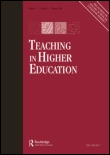
TEACHING IN HIGHER EDUCATION
Exploring transformative practices in university teaching.TEACHING IN HIGHER EDUCATION is a premier academic journal published by Routledge Journals, Taylor & Francis Ltd, dedicated to advancing the scholarship and practice of teaching within the higher education sector. With an ISSN of 1356-2517 and an E-ISSN of 1470-1294, this journal is widely recognized for its profound impact in the field, boasting a 2023 category rank of Q1 in Education, placing it in the top tier of educational research. Its commitment to fostering an inclusive and dynamic discourse on pedagogical methods and learning frameworks makes it essential reading for researchers, educators, and policymakers alike. Spanning topics such as student engagement, curriculum development, and innovative teaching strategies, TEACHING IN HIGHER EDUCATION aims to contribute to ongoing conversations and practical applications that enhance the educational landscape. While an Open Access option is not available, the journal maintains a robust readership, with its articles being rigorously peer-reviewed and disseminated to reflect cutting-edge research trends and practices in education.
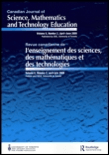
Canadian Journal of Science Mathematics and Technology Education
Elevating Educational Practices in STEM DisciplinesCanadian Journal of Science Mathematics and Technology Education (ISSN: 1492-6156; E-ISSN: 1942-4051) is a prominent publication by SPRINGER based in Switzerland, dedicated to exploring innovative methodologies and practices in the fields of science, mathematics, and technology education. Established in 2001 and continuing to 2024, the journal maintains a strong reputation within the academic community, reflected in its Q2 ranking in the Education category for 2023 and a commendable Scopus ranking that places it in the top 25% of journals within the social sciences education domain (Rank #383/1543). This journal serves as a critical platform for researchers, educators, and practitioners interested in the latest developments, research findings, and discussions pertaining to instructional strategies and curricular advancements. Although it is not open access, the journal's insights and contributions are invaluable for those aiming to elevate educational practices and address contemporary challenges in STEM education.
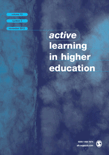
Active Learning in Higher Education
Fostering Engagement and Excellence in Higher EducationActive Learning in Higher Education is a premier journal dedicated to exploring innovative and effective pedagogical practices within the realm of higher education. Published by SAGE Publications Inc, this journal boasts an impressive Q1 ranking in the Education category for 2023, positioning it within the top percentile of academic journals in the field, with a Scopus rank of 21 out of 1543, reflecting its high impact and relevance. With coverage spanning from 2000 to 2024, the journal serves as a critical platform for researchers, educators, and students, providing insightful articles that delve into the theories, strategies, and technologies that enhance active learning experiences. While currently not open access, the enriching content is vital for anyone aiming to stay abreast of evolving methodologies and empirical studies in educational practices. Located in the United Kingdom, this journal is committed to advancing the academic discourse surrounding higher education, making it essential reading for those interested in fostering student engagement and learning outcomes.
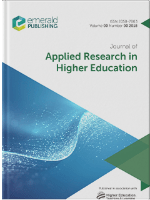
Journal of Applied Research in Higher Education
Transforming Insights into Action in Higher EducationJournal of Applied Research in Higher Education, published by EMERALD GROUP PUBLISHING LTD, is a pivotal resource in the field of education, with a particular focus on practical applications and research-driven insights in higher education settings. With an ISSN of 2050-7003 and an E-ISSN of 1758-1184, this journal has established itself as a respected outlet since its inception in 2009, demonstrating robust growth and academic rigor. Notable for its impressive Q2 ranking in the education category of Scopus and positioned in the 79th percentile among over 1500 journals in Social Sciences _ Education, it is a must-read for researchers, practitioners, and students who seek to explore innovative methodologies and contemporary challenges in higher education. While it does not currently offer open access, the journal features a range of insightful articles that contribute to the advancement of knowledge and practice in the sector, making it an essential tool for fostering educational improvement and policy development.

Chemistry Teacher International
Inspiring Future Generations of ChemistsChemistry Teacher International is a prominent peer-reviewed journal dedicated to the field of chemistry education, published by WALTER DE GRUYTER GMBH. With its Open Access policy since 2018, this journal ensures that research is widely disseminated to educators, researchers, and practitioners globally. Located in Berlin, Germany, it aims to promote innovative teaching methodologies and practical applications in chemical sciences. The journal has consistently achieved a Q2 ranking in both the Chemistry (Miscellaneous) and Education categories as of 2023, reflecting its relevance and impact within the academic community. Over its converged years from 2019 to 2024, Chemistry Teacher International fosters a collaborative platform for sharing research, insights, and pedagogical strategies, thereby contributing to the advancement of chemistry education on a global scale.
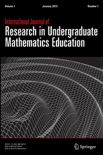
International Journal of Research in Undergraduate Mathematics Education
Elevating Undergraduate Learning through ResearchInternational Journal of Research in Undergraduate Mathematics Education is a premier peer-reviewed journal published by Springer International Publishing AG, dedicated to the advancement of research and scholarship in the field of undergraduate mathematics education. With an ISSN of 2198-9745 and an E-ISSN of 2198-9753, this journal serves as a crucial platform for educators, researchers, and policymakers to disseminate innovative findings and pedagogical strategies that enhance mathematical understanding among undergraduates. Positioned in the esteemed Q2 ranking in both the Education and Mathematics (miscellaneous) categories for 2023, it boasts a respectable Scopus ranking—17th out of 90 in Mathematics and 578th out of 1543 in Social Sciences (Education), placing it in the top percentiles of both fields. The open access format ensures that research is widely accessible, fostering collaboration and knowledge-sharing across the global academic community. Since its inception in 2016, the journal has been committed to publishing high-quality research addressing various dimensions of mathematics education, making it an essential resource for those engaged in enhancing educational practices and outcomes.
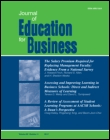
Journal of Education for Business
Pioneering Research for Dynamic Business EducationJournal of Education for Business, an esteemed publication within the fields of Business, Management, and Education, is published by Routledge Journals, Taylor & Francis Ltd. With an ISSN of 0883-2323 and an E-ISSN of 1940-3356, this journal provides a platform for innovative research that bridges the gap between business theory and educational practice. As a recognized leader in its domain, the journal holds a notable Q2 ranking in both the Business and Education categories for 2023, reflecting its impact and relevance in these competitive fields. The journal is indexed in Scopus with commendable rankings, making it a valuable resource for academics and practitioners aiming to enhance educational methods in business contexts. While it currently does not offer open access, the insights contained within its pages are crucial for anyone seeking to advance their understanding of the dynamic intersection between education and business. Engaging with the Journal of Education for Business not only contributes to scholarly discourse but also provides practical applications valuable to educators and industry professionals alike.

TEACHING OF PSYCHOLOGY
Exploring Cutting-edge Approaches in Psychology InstructionTEACHING OF PSYCHOLOGY is a distinguished academic journal published by SAGE Publications Ltd, focusing on the field of psychology education. Established in 1975, this journal has carved out a vital niche in the academic landscape, facilitating the dissemination of innovative teaching practices, research outcomes, and pedagogical strategies that enhance the learning experience in psychology. With an impressive H-index indicating its influence, TEACHING OF PSYCHOLOGY is ranked in the second quartile for Education and third quartile for Psychology (Miscellaneous) in 2023, reflecting its pivotal role in these fields. The journal boasts a robust Scopus ranking, placing it within the 55th percentile for Social Sciences - Education and the 42nd percentile for General Psychology, demonstrating its relevance and reach among scholars and practitioners alike. Although it does not offer open access, it remains a crucial resource for educators, researchers, and students seeking to enhance their understanding and application of psychological principles in educational settings. By contributing to the ongoing dialogue about effective teaching methodologies in psychology, the journal aims to inspire and inform educators, fostering an environment of rigorous academic inquiry and practical application.

JOURNAL OF FURTHER AND HIGHER EDUCATION
Leading the Conversation on Educational AdvancementJournal of Further and Higher Education, published by Routledge Journals, Taylor & Francis Ltd, stands as a prominent platform in the field of education, with a distinguished focus on further and higher education studies. With an ISSN of 0309-877X and E-ISSN of 1469-9486, this journal has been contributing invaluable insights since its inception in 1977. The journal boasts a remarkable Q1 ranking in its category for 2023, placing it in the top tier of educational research, underscored by its 83rd percentile ranking among Scopus Ranks in Social Sciences - Education. Researchers and practitioners alike are encouraged to submit their work, as the journal aims to foster innovative discussions and disseminate high-quality scholarly articles that address contemporary challenges in further and higher education. With its commitment to academic excellence, Journal of Further and Higher Education plays a crucial role in shaping policy and practice in the educational landscape, ensuring that the voices of educators and learners are heard and valued.